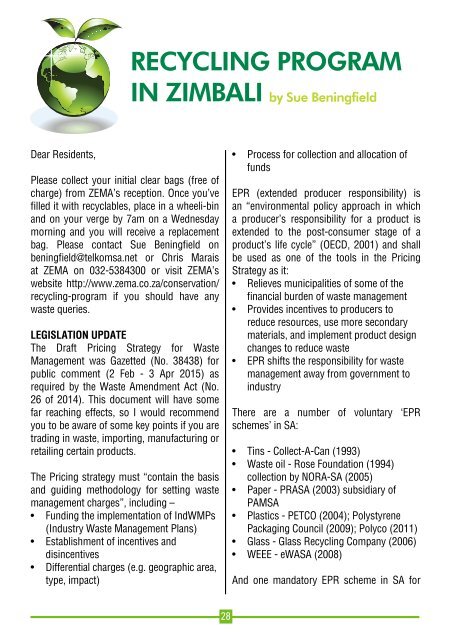BUSH TELEGRAPH
Create successful ePaper yourself
Turn your PDF publications into a flip-book with our unique Google optimized e-Paper software.
RECYCLING PROGRAM<br />
IN ZIMBALI by Sue Beningfield<br />
Dear Residents,<br />
Please collect your initial clear bags (free of<br />
charge) from ZEMA’s reception. Once you’ve<br />
filled it with recyclables, place in a wheeli-bin<br />
and on your verge by 7am on a Wednesday<br />
morning and you will receive a replacement<br />
bag. Please contact Sue Beningfield on<br />
beningfield@telkomsa.net or Chris Marais<br />
at ZEMA on 032-5384300 or visit ZEMA’s<br />
website http://www.zema.co.za/conservation/<br />
recycling-program if you should have any<br />
waste queries.<br />
LEGISLATION UPDATE<br />
The Draft Pricing Strategy for Waste<br />
Management was Gazetted (No. 38438) for<br />
public comment (2 Feb - 3 Apr 2015) as<br />
required by the Waste Amendment Act (No.<br />
26 of 2014). This document will have some<br />
far reaching effects, so I would recommend<br />
you to be aware of some key points if you are<br />
trading in waste, importing, manufacturing or<br />
retailing certain products.<br />
The Pricing strategy must “contain the basis<br />
and guiding methodology for setting waste<br />
management charges”, including –<br />
• Funding the implementation of IndWMPs<br />
(Industry Waste Management Plans)<br />
• Establishment of incentives and<br />
disincentives<br />
• Differential charges (e.g. geographic area,<br />
type, impact)<br />
• Process for collection and allocation of<br />
funds<br />
EPR (extended producer responsibility) is<br />
an “environmental policy approach in which<br />
a producer’s responsibility for a product is<br />
extended to the post-consumer stage of a<br />
product’s life cycle” (OECD, 2001) and shall<br />
be used as one of the tools in the Pricing<br />
Strategy as it:<br />
• Relieves municipalities of some of the<br />
financial burden of waste management<br />
• Provides incentives to producers to<br />
reduce resources, use more secondary<br />
materials, and implement product design<br />
changes to reduce waste<br />
• EPR shifts the responsibility for waste<br />
management away from government to<br />
industry<br />
There are a number of voluntary ‘EPR<br />
schemes’ in SA:<br />
• Tins - Collect-A-Can (1993)<br />
• Waste oil - Rose Foundation (1994)<br />
collection by NORA-SA (2005)<br />
• Paper - PRASA (2003) subsidiary of<br />
PAMSA<br />
• Plastics - PETCO (2004); Polystyrene<br />
Packaging Council (2009); Polyco (2011)<br />
• Glass - Glass Recycling Company (2006)<br />
• WEEE - eWASA (2008)<br />
And one mandatory EPR scheme in SA for<br />
28




